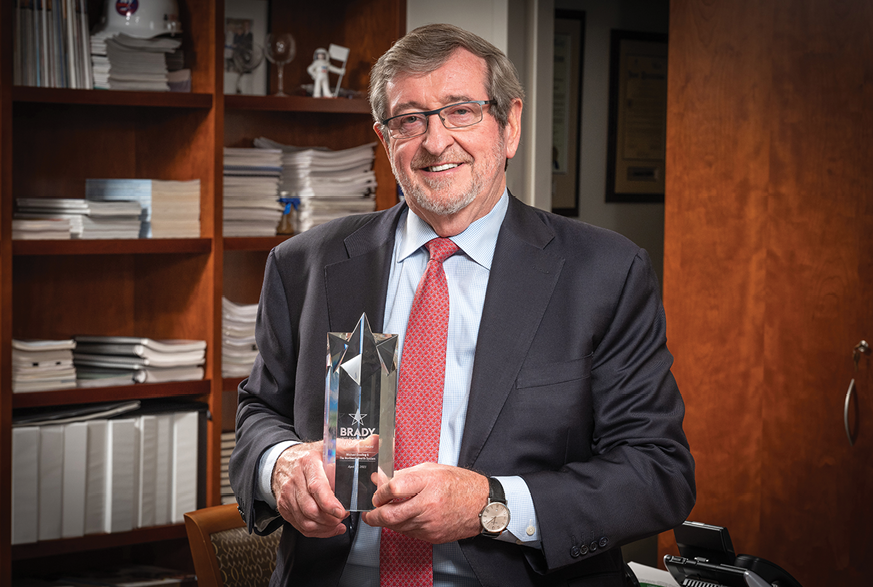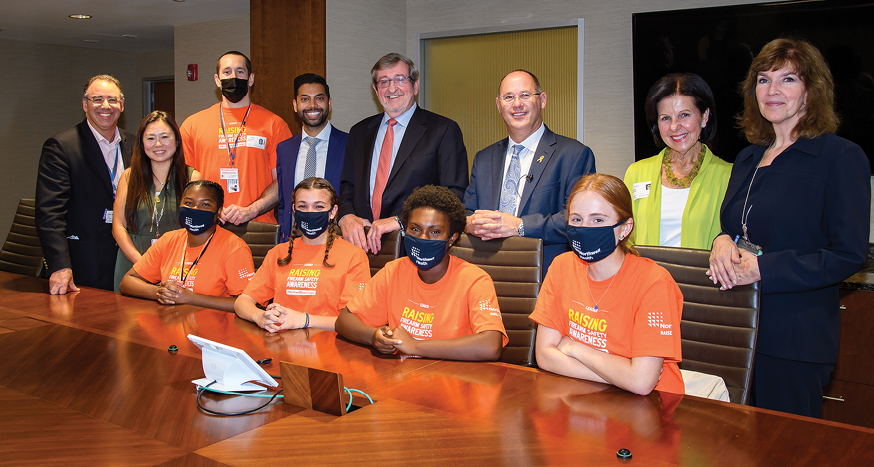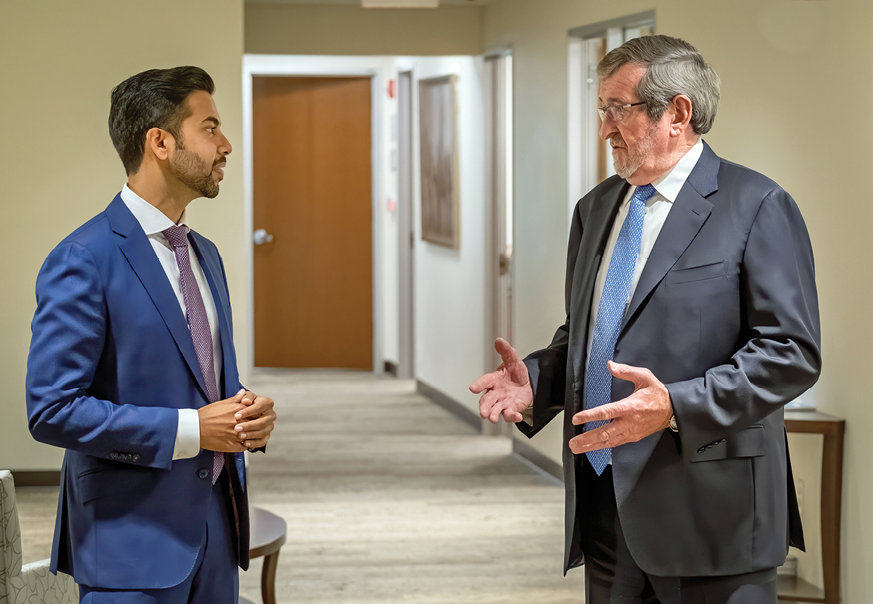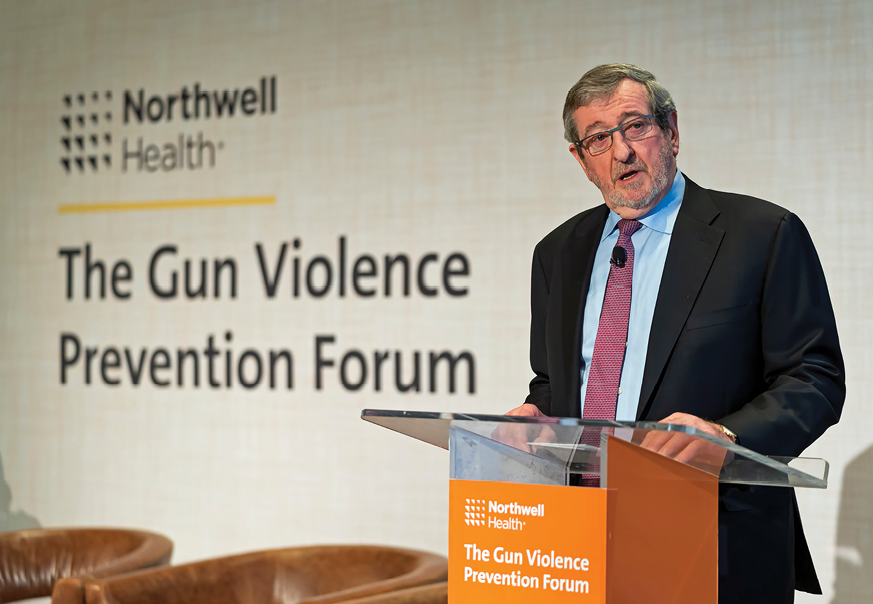- Home
- Media Kit
- MediaJet
- Current Issue
- Past Issues
- Ad Specs-Submission
- Ad Print Settings
- Reprints (PDF)
- Photo Specifications (PDF)
- Contact Us
![]()
ONLINE
![]()
ONLINE


Michael J. Dowling
A Public Health Issue
Editors’ Note
Michael Dowling is one of healthcare’s most influential voices, taking a stand on societal issues such as gun violence and immigration that many health system CEOs shy away from. His leadership has been invaluable to Northwell’s consistent expansion and prominence. In March 2020, he successfully navigated the health system through the first COVID-19 epicenter in the U.S., detailing Northwell’s experiences in a book entitled, Leading Through a Pandemic: The Inside Story of Humanity, Innovation, and Lessons Learned During the COVID-19 Crisis. Overall, Northwell has treated over 300,000 COVID patients – more than any other U.S. health system.
Prior to becoming CEO in 2002 and joining Northwell in 1995, Dowling served in New York State government for 12 years, including seven years as State Director of Health, Education, and Human Services and Deputy Secretary to the Governor, and the final two years as Commissioner of the State Department of Social Services. Earlier, he was a Professor of Social Policy and Assistant Dean at the Fordham University Graduate School of Social Services and Director of the Fordham campus in Westchester County. Dowling has been honored with many awards and recognitions over the years, including the Ellis Island Medal of Honor, the Presidential Distinguished Service Award for Irish Abroad, the Alfred E. Smith Award from the American Society for Public Administration, the National Human Relations Award from the American Jewish Committee and the Foreign Policy Association Medal Award. In 2017, he was selected to serve as the Grand Marshal of New York’s St. Patrick’s Day Parade.
For 15 consecutive years, Modern Healthcare has ranked Dowling on its annual list of the “100 Most Powerful People in Healthcare,” including the #3 ranking in 2021. He also placed #22 among the nation’s large company CEOs on Glassdoor’s “Top CEOs in 2021” and ranked second among healthcare/hospital CEOs.
Dowling is past Chair of the Healthcare Institute and the current Chair of the Institute for Healthcare Improvement (IHI). He is a member of the Institute of Medicine of the National Academies of Sciences and the North American Board of the Smurfit School of Business at University College, Dublin, Ireland. He also serves as a board member of the Long Island Association. He is past chair and a current board member of the National Center for Healthcare Leadership (NCHL), the Greater New York Hospital Association, the Healthcare Association of New York State and the League of Voluntary Hospitals of New York. Dowling was an instructor at the Center for Continuing Professional Education at the Harvard School of Public Health. He earned his undergraduate degree from University College Cork (UCC), Ireland, and his master’s degree from Fordham University. He also has honorary doctorates from the prestigious Queen’s University Belfast, University College Dublin, Hofstra University, Dowling College and Fordham University.
Institution Brief
Northwell Health (northwell.edu) is a clinical, academic and research enterprise with a workforce of more than 77,000 and annual revenue of $15 billion. Northwell is the largest healthcare provider and private employer in New York State, caring for more than two million people annually through a vast network of more than 830 outpatient facilities, including 220 primary care practices, 52 urgent care centers, home care, rehabilitation and end-of-life programs, and 22 hospitals. Northwell also pursues pioneering research at the Feinstein Institutes for Medical Research and a visionary approach to medical education highlighted by the Zucker School of Medicine, the Hofstra Northwell School of Nursing and Physician Assistant Studies, and one of the nation’s largest medical residency and fellowship programs.

Baldwin High School wins the Feinstein Institutes’
annual science competition
Northwell Health has taken a leadership role on the issue of gun violence in America. What was the thinking behind Northwell’s engagement and commitment to addressing this issue?
I believe very strongly that as leaders of large organizations, we have a special responsibility and obligation – to use our influence to address larger societal issues. One of those issues is the growing “pandemic” of gun violence. It is especially relevant for healthcare leadership because it is, at it’s core, a public health issue. To protect the health and wellness of our communities, we should be fueling the public outrage needed to stop the mindless bloodshed. We in healthcare deal with the results on a daily basis – we see it in our emergency departments, in our operating rooms, in our behavioral health clinics. It is devastating to families and those communities involved – and it’s getting worse. We cannot stand on the sidelines and pretend that it is not part of our obligation. Every leader of every organization should get involved.
At Northwell, we created the Center for Gun Violence Prevention to lead our efforts. We are investing in gun violence research, developing best practices for health systems and hospitals, partnering with other like-minded organizations regionally and nationally. We have held very successful Annual Gun Violence Prevention Forums and created a nation-wide Learning Collaborative that brings together healthcare leaders from across the U.S. to learn and share. We have also been fortunate to be one of the first to receive an NHI grant to establish and implement a first-of-its kind protocol to universally screen all patients who come to our emergency departments for gun injury risk – we ask questions about firearms in the home, and about the safety of those firearms. We routinely ask questions about diet and exercise, about smoking and alcohol -- we now ask about guns and gun safety and recommend appropriate follow-up based on the answers.
The feedback from employees has been overwhelmingly positive.
“To protect the health and wellness of our communities, we should be fueling the public outrage needed to stop the mindless bloodshed. We in healthcare deal with the results on a daily basis – we see it in our emergency departments, in our operating rooms, in our behavioral health clinics. It is devastating to families and those communities involved – and it’s getting worse.”
Is it possible to drive impact and change on the issue of gun violence prevention without federal legislation?
I think you can move the needle by getting a much bigger audience and getting traction when you talk about it as a public health issue. This builds a broader coalition which is important. It is definitely true that you need federal legislation to create sustainable change and this takes persistence and resilience because the politics of the moment seems to be going the other way. I go back to the days when Ralph Nader talked about the need to put airbags and seat belts in cars, and people thought he was crazy. Today, you cannot buy a car without airbags and seat belts.
When it comes to gun violence prevention, we need to be in this for the long haul. I do not believe there is any quick, immediate fix, but I do believe in the long run there will be action since it has to happen. You have to lay the groundwork and take it piece by piece – it is about small wins that over time will lead to bigger wins. When I look at our annual conference on gun violence prevention, we have a lot more people involved and engaged today then we did when we started this. If you want to create real change, you have to be committed for the long haul – I agree with the saying, “It takes many, many years to have an overnight success.”

Dr. Chethan Sathya, Director, Center for Gun Violence Prevention
at Northwell Health, with Michael Dowling
What role can the broader business community play in addressing gun violence prevention?
I There have been businesses that have taken action around selling guns in their stores, even if it may negatively impact their revenue, such as Dick’s Sporting Goods and Walmart. There are businesses that are addressing this because they know that we need to build safe communities for our children and grandchildren, and it is also critical to have safe communities for our businesses to operate since our employees live in these communities. They should be supported and applauded.
“I believe that every CEO has two responsibilities – there is an internal responsibility and an external responsibility. The internal responsibility is to manage the business in the best way possible and to create value. The external responsibility is to be engaged in the community and to be a catalyst to create positive change. I believe it is critical that CEOs have this external focus and take on issues that impact the communities they serve.”
It is important that the message is clear that this effort is not about being against gun ownership – it is about gun violence prevention and safety. The fact is that the vast majority of gun owners are also for gun safety and gun violence prevention.
I believe that every CEO has two responsibilities – there is an internal responsibility and an external responsibility. The internal responsibility is to manage the business in the best way possible and to create value. The external responsibility is to be engaged in the community and to be a catalyst to create positive change. I believe it is critical that CEOs have this external focus and take on issues that impact the communities they serve. It is true that it may bring controversy when you get involved in these issues – with leadership comes controversy, with leadership comes risk, with leadership comes criticism – leaders need to stand up and be accountable.

Michael Dowling speaking on gun violence prevention
at a forum hosted by Northwell Health
You mentioned the need to be in this effort for the long haul and to have resilience. Is it frustrating when you see the slow pace of change?
We would all hope to see a quicker response and more immediate results, but you need to have resilience. This is just a fact of life. There are people that would like to graduate college in six months, but it takes four years. There are people who want to be a CEO in five years, but it may take 20 years. I believe that life in many ways is an exercise and an experiment in resilience.
We do get frustrated when we see basic, common-sense actions that are needed still not taking place, but change takes time. The question is whether we want the United States to be the outlier when it comes to unnecessary gun violence. The more we broaden the coalition and build awareness and understanding that gun violence is a public health issue, the more opportunity we have to create real, lasting change.![]()